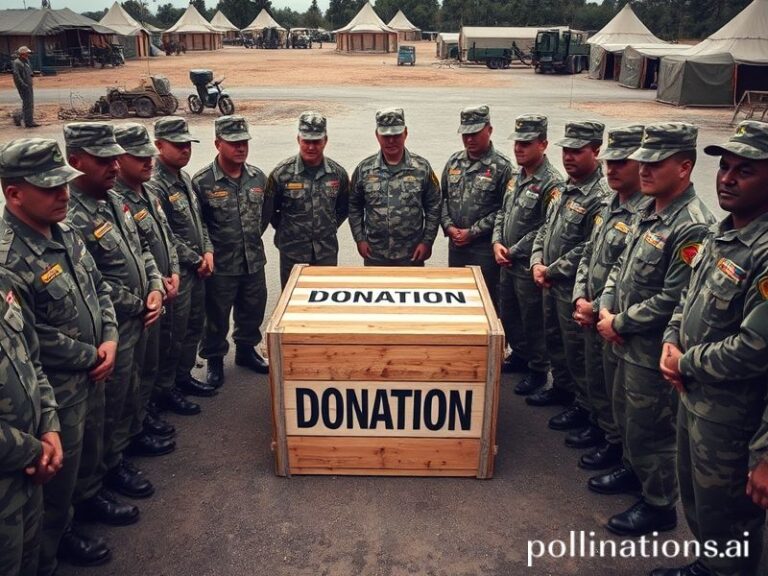Planet Earth’s Favorite Never-Ending Melodrama: Israel and the Global Supply Chain of Outrage
The Bigger Tantrum: How Israel Became Everyone’s Favorite Emotional Support Conflict
If the planet were a badly lit bar at 3 a.m., Israel would be the patron standing on a stool, waving a half-empty flag and explaining—loudly—why everyone else is ruining the evening. The rest of us, nursing watered-down geopolitics and existential dread, keep ordering refills because this particular brawl has become the house entertainment. From Berlin to Bangkok, cable-news chyrons treat the Levantine drama like a prestige mini-series that refuses to wrap up: characters introduced in 1948 still haven’t made it past the pilot, and every network insists on its own spoiler-filled recap.
The international significance is almost comically outsized. A sliver of land the size of New Jersey somehow manages to hijack U.N. agendas, college syllabi, and your cousin’s Instagram story in real time. When the Knesset sneezes, the European Union reflexively offers a tissue laced with conditions. When rockets arc over Tel Aviv, oil futures do calisthenics and every hedge-fund bro in Connecticut suddenly becomes a Middle-East savant on Twitter. The moral: in a global economy premised on fragile supply chains and even more fragile egos, the world’s smallest strip of existential angst doubles as its largest market-moving mood ring.
Washington, perennial helicopter parent, oscillates between sending band-aids and sending strongly worded report cards. This week it’s $14 billion in “please calm down” money; next week it’s a finger-wagging State Department tweet that gets ratioed by everyone, including the official account of the Icelandic fishing board. Moscow and Beijing watch from the cheap seats, offering popcorn seasoned with schadenfreude. Their takeaway: if you want to keep the Americans busy, just gift-wrap a tribal grudge and label it “strategic ally.” The Kremlin, still digesting Ukraine, finds it refreshing to spectate on a conflict where no one expects them to fix anything beyond the occasional veto.
Meanwhile, the Global South has discovered the lucrative art of grievance arbitrage. Gulf monarchies, whose weekend entertainment once consisted of gold-plated falcons, now compete to see who can condemn “Zionist aggression” the loudest without canceling the cyber-security contracts that keep their own dissidents offline. South American governments—well-practiced in rewriting histories of colonial brutality—passionately denounce occupation from the comfort of air-conditioned chambers named after conquistadors. The hypocrisy is so symmetrical it could be a UNESCO heritage site.
Europe, still guilt-tripping on a seventy-five-year delay, funds NGOs the way others collect Funko Pops: lots of colorful packaging, minimal resale value. Berlin’s foreign minister flies in for a photo-op at a West Bank checkpoint, quietly praying the ensuing tweet will drown out domestic stories about pension reform. Paris, never one to miss a moral runway show, dispatches diplomats wearing keffiyehs like seasonal scarves. Somewhere in Brussels, an intern is updating the color-coded spreadsheet titled “Who Still Likes Us Today?”
And yet, the darkest joke is structural: the conflict’s durability has become its own business model. Think-tank fellows time their book releases to coincide with flare-ups; weapons manufacturers measure profit margins in half-lives; and every university endowment quietly rebalances so that both “Israel Innovation” and “BDS-compliant” ETFs appear in the portfolio, hedging outrage like any other volatility index. The human tragedy is real, but the market has priced it in—complete with ESG ratings and a premium for brand risk.
What does it all mean for the average citizen of Earth? Simply that your late-night doom-scroll now comes with a mandatory side order of Levantine angst. Whether you’re binge-watching missiles over Gaza or settler TikToks from Hebron, the algorithm has decided this is your emotional cardio. Resistance is futile; even the meditation app begins its breathing exercise with, “Notice the tension you feel about the two-state solution.”
Conclusion: In a world desperate for tidy endings, Israel remains the stubborn plot twist that refuses to resolve, reminding us that some stories endure precisely because they sell better without a finale. Until we tire of the spectacle—or the popcorn runs out—the stool will stay occupied and the bar will stay open. Last call is nowhere in sight.







